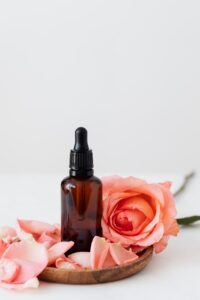Healthy, Radiant Glow

Rose oil is a versatile and natural ingredient that has been used for centuries for its therapeutic and cosmetic properties. Extracted from the petals of the Rosa damascena or Rosa centifolia plant, rose oil is known for its fragrant aroma and its ability to hydrate, soothe and rejuvenate the skin. In this blog post, we will explore the many benefits of rose oil for achieving a healthy, radiant glow.
Hydration
One of the primary benefits of rose oil is its ability to hydrate the skin. Rose oil contains a high amount of linoleic acid, an essential fatty acid that helps to strengthen the skin’s barrier and prevent moisture loss. This makes rose oil an ideal ingredient for those with dry, dehydrated or mature skin. By using rose oil regularly, you can help to keep your skin supple, soft and moisturized, giving it a healthy glow.
Anti-aging
Rose oil is also a potent anti-aging ingredient. It is rich in antioxidants, which help to protect the skin from free radical damage that can cause premature aging. Additionally, rose oil contains vitamin A, which is essential for healthy skin cell regeneration, and vitamin C, which helps to boost collagen production. By using rose oil regularly, you can help to reduce the appearance of fine lines and wrinkles and improve the overall texture and tone of your skin.
Soothing
Rose oil is also known for its soothing properties. It contains a natural anti-inflammatory compound called beta-caryophyllene, which can help to calm and soothe irritated or inflamed skin. This makes rose oil an ideal ingredient for those with sensitive or reactive skin. Additionally, the gentle aroma of rose oil can have a calming effect on the mind, helping to reduce stress and promote relaxation.

Brightening
Another benefit of rose oil is its ability to brighten the skin. Rose oil contains a compound called ellagic acid, which has been shown to inhibit the production of melanin, the pigment that gives skin its color. This means that by using rose oil regularly, you can help to reduce the appearance of dark spots and hyperpigmentation, giving your skin a brighter, more even tone.
Acne-fighting
Rose oil is also effective at fighting acne. It contains natural antibacterial and antifungal compounds that can help to kill the bacteria that causes acne. Additionally, rose oil contains salicylic acid, which is a common ingredient in acne treatments due to its ability to exfoliate the skin and unclog pores. By using rose oil regularly, you can help to prevent breakouts and keep your skin clear and healthy.
How to use rose oil for skincare
There are many ways to incorporate rose oil into your skincare routine. One popular method is to mix a few drops of rose oil into your moisturizer or facial oil. This will help to boost hydration and nourishment, while also delivering the many benefits of rose oil directly to your skin. You can also use rose oil as a spot treatment for acne or dark spots, or as a gentle massage oil for the face and body.
Another great way to enjoy the benefits of rose oil is to use it in a facial steam. Simply add a few drops of rose oil to a bowl of hot water, place a towel over your head to create a steam tent, and breathe deeply for a few minutes. The steam will help to open your pores, allowing the rose oil to penetrate deeply into your skin, while also helping to relax and soothe your mind.

Conclusion
Overall, rose oil is a versatile and natural ingredient that offers a wide range of benefits for achieving a healthy, radiant glow. Whether you are looking to hydrate and nourish your skin, fight signs of aging, or calm and soothe irritation, rose oil is an excellent choice. With regular use, you can enjoy the many benefits of this wonderful oil and achieve a glowing complexion that radiates health and vitality. So why not give rose oil a try and experience the beauty and skincare benefits for yourself? Your skin will thank you for it!




